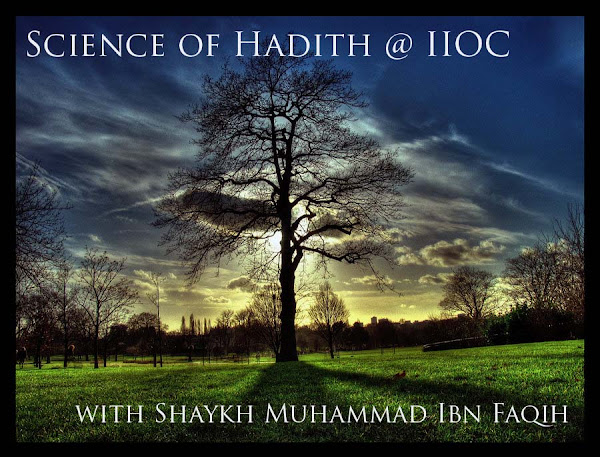The Classification of Hadith (Mustalah al-Hadith)
Sahih Bukhari said that Abul Yaman told them that Shu`ayb said that Abul-Zinat said to the al-A`raj who said to Abu Hurayrah that the Prophet (saws), “Indeed to Allah belongs 99 names, 100 except 1, whosoever memorize them will enter Paradise.” – Narrated by Sahih Bukhari & Muslim (muttafiqun `alayhi)
Hadith is not only narrated by Bukhari & Muslim, but also by al-Tirmidhi through al-Walid ibn Muslim (died 195 AH)
collected by Ibn Maja (through `Abdul Malik al-San`ani) & al-Hakim (through `Abdul `Aziz ibn al-HuSayn) as well
He continues to mention what he perceived to be the 99 names of Allah so it seems that this part is part of the hadith. It is almost unanimous consensus amongst the scholars that this specific part was not part of the hadith Idraj
This list does not really mention all of the names of Allah (swt)
Ibn Hazm – “Only 67 are authentic and the rest have no basis in the Qur'an and the Sunnah.”
Shaykh Ibn `Uthaymin says that 81 of those names are the Qur'an and 18 are from the Sunnah of the Prophet (saws).
Controversial names are from names 30-39
Jamal Zarabozo has a good article on this specific topic.
AaHaad (plural of aHad) – anything other than mutawatir; it has only a few number of people at each level. There is a disagreement amongst scholars about how many are to be at each level in order for the hadith to be considered mutawatir. There are three types:
Mash-hur (common) – a hadith that is related by three to nine people and did not reach tawatur in any part of the chain
Example: “Allah does not take knowledge out of the hearts of people, however knowledge is taken away from people by the death of the scholars.”
`Aziz (strong, rare, supported) – a hadith that was related by two people in any tabaqaha of the chain
Example: “None of you is a true believer until I am dearer to him than his children, his parents, etc.”
Gharib (strange) – a hadith that was related by only one person at every tabaqah.
Example: “Verily actions are judged by their intentions…“ – `Umar ibn al-Khattab
Mainly, mustalah al-Hadith is not concerned with Mutawatir, simply because there is no need to study the chains of narration in this level of hadith. It is mainly concerned with ahadith that are aaHaad. It is divided into two categories:
Maqbul (accepted) – if this hadith can most likely be attributed to the prophet (saws), then it is accepted.
Sahih
Sahih li dhatihi (authentic in and of itself)
Sahih li ghayrihi (authentic by another hadith) – a hadith in this section consists of one weak hadith, and one strong hadith that supports it.
Hasan
Hasan li dhatihi (sound in and of itself)
Hasan li ghayrihi (sound by another hadith) – the hadith about divorce being the most hated halal act.
Mardud (rejected) – if this hadith cannot be attribute to the prophet (saws), then it is rejected.
Da`if (weak)
MawDu` or Makdhub (fabricated; forged) – this is NOT a hadith, it is abrogated
Notes taken by Mohammad Mertaban

1 comment:
Jazakum Allah khairan for this useful blog and for sharing your notes in detail - great job!
I have a couple of questions on the notes:
1. The hadith "Verily actions are judged by their intentions..." seems to be mentioned in 2 places (under mutawatir and gharib). Are those 2 slightly different narrations of the hadith?
2. Is the Mash-hur (common) hadith, narrated by 3 - 9 people in every tabaqah or all together?
Jazakum Allah khairan once again
Post a Comment